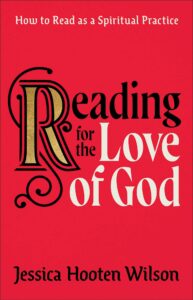Reading Wide
I read an interesting book review in the Christian Century encouraging Christians to read – and not just the Bible.  It was Erik Hoeke’s review of Jessica Hooten Wilson’s new book, Reading for the Love of God: How to Read as a Spiritual Practice.
It was Erik Hoeke’s review of Jessica Hooten Wilson’s new book, Reading for the Love of God: How to Read as a Spiritual Practice.
It’s a good bet that readers of the Christian Century, the flagship magazine of U.S. mainline Protestantism, might already like the idea of wide-ranging reading, but apparently Wilson’s book also addresses the how and why of it. “Reading books of history, poetry, rhetoric, and narrative trains us to read and interpret the same genres found in scripture,” says reviewer Hoeke. But there’s more: “We become more capable of seeing God’s beauty revealed in nonreligious texts.”
For one thing, just reading the Bible can be dangerous. As Eugene Peterson pointed out, handing someone a Bible and simply saying, “Read it!” is as foolish as giving car keys to a novice teenager and just saying, “Drive it!” Different parts of the Bible have been used as a weapon to excuse racism, war, or slavery. Passages also have been twisted to support genocide, as many German church supporters of the Nazis did during the Holocaust.
Also the Bible has many layers of meaning, which can be misunderstood. For example, the oft-quoted words in Isaiah 2:4, about beating “swords into ploughshares,” does not necessarily mean it’s wise for all nations to abandon their military defense. Likewise in Mark 12:44, when Jesus noticed the widow who gave “all she had” to the offering, he may not have meant for everyone to do likewise. Some Bible scholars say he may have been indicting the rich leaders who had robbed her of everything under the guise of religion. We need to know what the Bible is, to learn how to read it in its original context, and to see it in the context of the whole in order to understand it in our life setting now.
In addition to studying the Bible, reading secular-category books can give plenty of benefits. It can encourage the reader’s empathy for people in other cultures, times, and circumstances. Reading widely can increase compassion toward diverse peoples. Also, as Hoek says, reading a variety of books can cultivate “a deeper love and enjoyment of God.” God is at work in people’s lives in so many ways!
The idea of regularly reading more than the Bible is not new. For example, Methodist founder John Wesley (1703-1791) was a voracious reader throughout his life and had broad literary interests. He even read books while riding his horse from one preaching spot to another. When he was older and needed help getting from place to place, he kept a book to read in the carriage for the travel time. Besides classics, devotionals, and the Church of England’s Book of Common Prayer, he was particularly drawn to the natural sciences and to English history.
These days, reading across different genres can be part of an intentional plan to understand other people and to notice what God is doing in many areas of life. For example, despite my low level understanding of math, I have learned a lot about how God works through the books by quantum scientist Stephen Hawking. Since retiring and getting to know other regional writers, I’ve found I enjoy several genres of books, from memoirs to thrillers to science fiction. They prompt me to reflect on the human condition, consider ethical issues and their consequences, and observe God at work in human lives.
Reading widely can be a “spiritual discipline,” meaning a regular habit of a Jesus follower. When we are open to multiple understandings and perspectives, God the Holy Spirit has more space to work on our minds and hearts. We can gain a broader perspective for living related to God, other people, and ourselves. I hope you’ll keep taking the opportunity to read from many different sources in these days ahead.
Your partner in faith,
Betsy Schwarzentraub


